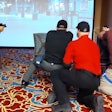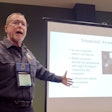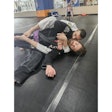Tony, a chronically homeless man, lived in Albuquerque's Civic Plaza—also known as Concrete Park—and was well known by police and aid workers alike. Not because he was a problem citizen; Tony's behavior rarely generated any complaints. Instead, the Albuquerque (N.M.) Police Department often received calls from citizens who were worried about the friendly man's welfare.
"He was always very pleasant and often interacted with the people in the park as he worked crossword puzzles to pass the time," says Det. Liz Thomson, Crisis Outreach Officer for the Albuquerque PD and coordinator of the city's innovative Strategic Outreach Teams. "But he sometimes didn't look well and acted confused. He would take water and snacks from outreach workers but other than that he did not access the local homeless shelters or services."
Unfortunately, Tony was just the type of person—chronically homeless but non-violent—who often falls through the cracks. In Albuquerque, however, several new, innovative approaches are working to shore up the system.
The Albuquerque Police Department has developed teams designed to address the gap between crisis intervention and long-term services. The Homeless Strategic Outreach Team includes Albuquerque PD officers, health care outreach workers, job counselors from Goodwill Industries, and a contract psychiatrist. The teams operate in all of Albuquerque PD's five area commands on a rotating basis.
The members of the Strategic Outreach Team participate in outreach to the homeless as an additional job duty. The teams go out for two hours at a time, three times a week to areas in the city where homeless people camp, panhandle, or congregate. When members encounter an individual who is amenable to help, the team comes up with a strategy and includes the homeless person in the discussion of the plan.
A vital component of the Strategic Outreach Teams is COAST (Crisis Outreach and Support Team) and its crisis specialists. A civilian-staffed support unit of the Albuquerque PD, they are on call 24 hours a day and are available to assist people in need, including those who are homeless or mentally ill. When an officer encounters such a person, he or she can call out a COAST specialist to assist. As civilian employees of the police department, the crisis specialists are in a unique position to build trust with those who may have had negative interactions with police or authority in the past.
All team members have different areas of expertise, which facilitates the process of connecting the correct resources to the correct individual. For example, the mentally ill, disabled, and "chronically inebriated" usually need more advanced services and support than those without these issues. But even the simplest of services—including SSI, SSDI, housing, food stamps, and more—are almost impossible to obtain without a birth certificate and/or an ID. Unfortunately, even if the homeless know how to obtain these documents, transportation and funds are usually a prohibitive factor.
"The most difficult obstacle is that services to both the homeless and the poor are very fragmented, spread out, and difficult to access," explains Thomson. "There is no 'one stop' place for help, and so the homeless become frustrated and further isolated by the system. After all, it's difficult even for a trained team of professionals to navigate the system. How can we expect an individual, who has no training or resources (not even a telephone) to do so? But our Strategic Outreach Teams are able to help find housing, shelter, bus tickets, meals, a lost family member, detox, rehab, a doctor, a counselor, a mechanic, and more. And they also make phone calls and refer back to law enforcement where appropriate."
The idea for the COAST program came from Chief Ray Schultz, who likes to call the program "CIT on steroids." It was based on a model from the Scottsdale (Ariz.) Police Department. Originally funded in 2005 as a pilot project by the City of Albuquerque's Department of Family and Community Services, the unit was started as a way to bridge a gap that exists in providing follow-through to people in crisis, particularly those who do not pose a danger to public safety.
Thomson, then a CIT detective with Albuquerque PD, was part of the team that developed the program. She also helped design and administer the training. The pilot program was so effective that COAST is now a permanent part of the police department within the Strategic Support Division.
"We do a lot with a little," Thomson notes. "Even though New Mexico is a poor state and ranks quite low on dollars spent on mental health, Albuquerque's programs are a model for the rest of the country."
Albuquerque's mayor, Martin Chavez, and Chief Schultz have made addressing homelessness and mental illness a priority, and to that end Albuquerque has created successful Drug and Mental Health Courts, a Family Advocacy Center, and a Homeless Court. The city also funded a Housing First program and an ACT (Assertive Community Treatment) team. The latter program addresses those with severe mental illness who do not respond to traditional modes of treatment and utilizes the same psychiatrist used by COAST and the Strategic Outreach Teams.
"There is a lot of overlap," says Thomson, "and so we are able to use the little money we do have to make it all work."
All of these various programs support both the homeless population and Albuquerque PD. Now that they are able to access COAST crisis specialists and the Strategic Outreach Teams, officers do not have to spend valuable time dealing with people who pose no threat to the community. Instead, their energy can be more efficiently spent on more important duties.
It's this partnership between COAST Crisis Specialists, service providers, the community, and the Albuquerque PD that has been the key to the success of the program, says Thomson.
"Traditionally law enforcement and service providers did not work together," she explains. "In fact we were at odds, mistrusting the intentions of the other. This made for a lot of work at cross-purposes. Since these issues have become a priority for leadership in our community we have been able to build trust and work together, which I believe makes the work more effective."
It's certainly made a difference for Tony. Once the Strategic Outreach Team started talking to him it became apparent that he particularly liked and trusted one of the police officers in the team. He would share parts of his life story with the officer; for example, that he had been in the military but had discontinued his VA benefits.
Once the team was aware of all the facts, they began to talk to Tony about the possibility of living indoors and pursuing his benefits again. The APD officer and the rest of the team worked together; contacting the VA, bringing Tony shoes and clothes, and taking him out to eat. At first the thought of living indoors frightened Tony; he had been outdoors many years and his military experiences made him leery of being confined by walls and ceilings.
"But after awhile Tony began to soften to the idea of having a place of his own with a balcony, so he could sit outside," says Thomson. "The team was able to facilitate his VA benefits, find him housing (including a balcony), and transition him from a life on the streets to a place of his own. He has been happily living in his own place for over a year."
For Thomson, who is also a police negotiator with Albuquerque, the work that she is doing now with the homeless is very fulfilling.
"Getting involved with the Strategic Outreach Team has been a very satisfying twist on being a cop," she says. "I get to help people and see their problems through to resolution, which is not normal for a beat cop; they rarely get to hear the 'rest of the story.' Plus I get to do investigation, including finding lost relatives, and I still get to arrest the occasional bad guy."
Kelly Kyrik is a freelance writer who lives in Colorado. She is a frequent contributor to POLICE.













